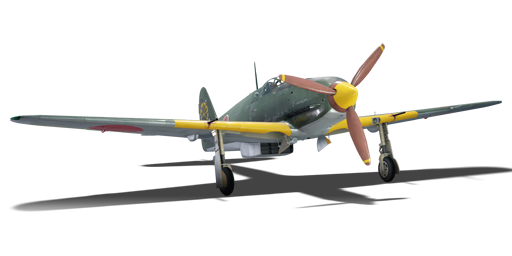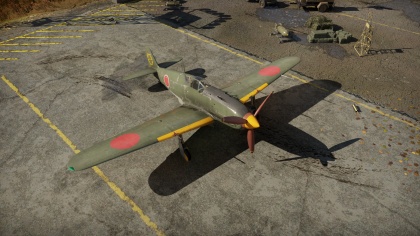Tada's Ki-61-I hei
Contents
Description
The Tada's Ki-61-I hei Hien is a premium rank IV Japanese fighter
with a battle rating of 5.3 (AB), 4.7 (RB), and 4.0 (SB). It was introduced in Update "Starfighters".
The "Hei" modification of the Ki-61 still retains the above average manoeuvrability, common to the Japanese aviation tree. However, the Hei Hien has some faults - its top speed is only 20 km/h higher than that of the early "Zeroes". Its climb rate is enough for its role, and it retains energy fairly well. While its acceleration holds itself pretty well, Its top speeds are not on par with other aircraft making it similar to the German Bf 109 G-6. Its guns are also a hit and miss - it is equipped with the deadly MG 151 20 mm cannons, and it can also equip German belts with minengeshcoß shells. However, the Japanese 12.7s are lower velocity and a bit on the weak side. The Hien's ammo count is average, albeit not as much as American aircraft. One thing to be noted is that the landing flaps are very effective and will slow you down even if you use WEP. That said, use them when you are trying to make somebody on your six overshoot you.
The Hei Hien's armament is flexible, as it is able to equip multiple kinds of bombs. With accuracy and shot placement, the large ammunition pool can work to your advantage. Equipping the air targets belt for the MG 151 cannons is the best choice for air combat. It features a high degree of minengeschoß shells, specially made German HE shells with thin walls. There is no 20 mm cannon shell in the game with more high explosive than the minengeschoß. As for the 12.7s, Stealth or Air target belts are your best bet. The best choice of bomb loadout is the 250 kg bombs due to the lack of precision needed. A pilot can miss a direct hit on a pillbox and still destroy it.
General info
Flight performance
Describe how the aircraft behaves in the air. Speed, manoeuvrability, acceleration and allowable loads - these are the most important characteristics of the vehicle.
| Characteristics | |||||||
|---|---|---|---|---|---|---|---|
| Stock | |||||||
| Max Speed (km/h at 6,000 m) |
Max altitude (meters) |
Turn time (seconds) |
Rate of climb (meters/second) |
Take-off run (meters) | |||
| AB | RB | AB | RB | AB | RB | ||
| 572 | 556 | 10300 | 21.9 | 22.5 | 7.1 | 7.1 | 380 |
| Upgraded | |||||||
| Max Speed (km/h at 6,000 m) |
Max altitude (meters) |
Turn time (seconds) |
Rate of climb (meters/second) |
Take-off run (meters) | |||
| AB | RB | AB | RB | AB | RB | ||
| 613 | 591 | 10300 | 20.3 | 21.0 | 13.7 | 10 | 380 |
Details
| Features | ||||
|---|---|---|---|---|
| Combat flaps | Take-off flaps | Landing flaps | Air brakes | Arrestor gear |
| ✓ | ✓ | ✓ | X | X |
| Limits | ||||
|---|---|---|---|---|
| Wing-break speed (km/h) |
Gear limit (km/h) |
Combat flaps (km/h) |
Max Static G | |
| + | - | |||
| 500 | ~10 | ~7 | ||
| Optimal velocities | |||
|---|---|---|---|
| Ailerons (km/h) |
Rudder (km/h) |
Elevators (km/h) |
Radiator (km/h) |
| < 360 | < 350 | < 460 | > 312 |
| Compressor (RB/SB) | ||
|---|---|---|
| Setting 1 | ||
| Optimal altitude | 100% Engine power | WEP Engine power |
| 3,550 m | 1,100 hp | 1,232 hp |
Survivability and armour
- 13 mm Steel plate behind the pilot
Armaments
Offensive armament
The Tada's Ki-61-I hei is armed with:
- 2 x 20 mm MG 151 cannons, -mounted (150 rpg = 300 total)
- 2 x 12.7 mm Ho-103 machine guns, -mounted (400 rpg = 800 total)
Suspended armament
The Tada's Ki-61-I hei can be outfitted with the following ordnance:
- Without load
- 2 x 50 kg Army Type 94 GPHE bombs (100 kg total)
- 2 x 100 kg Army Type 94 GPHE bombs (200 kg total)
- 2 x 250 kg Army Type 92 GPHE bombs (500 kg total)
Usage in battles
Instead of simply turn fighting the Ki-61 is very good at energy fighting, or "boom and zoom". Once at a high altitude the Hien pilot may choose to dive lower to attack an enemy. If the enemy is not destroyed on the first pass, it is recommended to climb sharply and gain altitude. By doing this, the Hien sets itself up for another attack while not being in the range of the enemy's guns.
The Hei Hien is best utilised as a multi-purpose fighter. Although proficient at energy fighting, the Ki-61 is also generally good at standard manoeuvres. It may lose turn fights with some enemy aircraft like the Spitfire Mk Vb/trop, but nonetheless it can still be used in multiple roles. The Hien is your standard "jack of all trades". It's not incredibly good at anything it does but is instead even across the board. This allows the Hien pilot to choose what role he or she wants to play in the battle. One could play the reserved, high flying energy fighter, or the aggressive low flying dog-fighter. The Ki-61 allows these choices.
If caught in a sticky situation, the Hien pilot may choose to do several things. Depending on your altitude, executing rolling scissors or an overshoot may be a valid tactic. Try to make the enemy pilot feel pressured to disengage. Depending on the enemy's aircraft, use your speed to your advantage and try to get away. The surest tactic would be communicating with teammates to ensure your assailant's death. Once tailed, the Hien pilot can "set up" an enemy by nosing up about 70 degrees so the entirety of the enemy plane is shown. At this stage, ideally, your teammate is arriving to save the day. In Realistic battles, if your team is made up of A6Ms it may also be beneficial to fly to them and start turn fighting.
Manual Engine Control
| MEC elements | ||||||
|---|---|---|---|---|---|---|
| Mixer | Pitch | Radiator | Supercharger | Turbocharger | ||
| Oil | Water | Type | ||||
| Not controllable | Controllable Not auto controlled |
Controllable Not auto controlled |
Controllable Not auto controlled |
Separate | Not controllable 1 gear |
Not controllable |
Modules
| Tier | Flight performance | Survivability | Weaponry | ||
|---|---|---|---|---|---|
| I | Fuselage repair | Radiator | Offensive 12 mm | 7 in (mod20) | |
| II | Compressor | Airframe | New 12 mm MGs | 10 in (mod24) | |
| III | Wings repair | Engine | Offensive 20 mm | 12 in (mod30) | |
| IV | Engine injection | Cover | New 20 mm cannons | ||
| This is a premium vehicle: all modifications are unlocked on purchase | |||||
Pros and cons
Summarise and briefly evaluate the vehicle in terms of its characteristics and combat effectiveness. Mark its pros and cons in the bulleted list. Try not to use more than 6 points for each of the characteristics. Avoid using categorical definitions such as "bad", "good" and the like - use substitutions with softer forms such as "inadequate" and "effective".
Pros:
- Above average manoeuvrability
- Good diving capabilities
- Equipped with German MG 151 cannons, firing minengeschoß shells
- Self-sealing fuel tanks
- Relatively good high altitude capabilities (compared to other Japanese tier III planes)
- High ammunition count
- Above average energy retention
- Able to equip bombs
Cons:
- Little armour
- Generally slow
- Wobbles in unexpected turns
- The aircraft's battle rating is high for its performance
- Vulnerable to fires
History
Describe the history of the creation and combat usage of the aircraft in more detail than in the introduction. If the historical reference turns out to be too long, take it to a separate article, taking a link to the article about the vehicle and adding a block "/History" (example: https://wiki.warthunder.com/(Vehicle-name)/History) and add a link to it here using the main template. Be sure to reference text and sources by using <ref></ref>, as well as adding them at the end of the article with <references />. This section may also include the vehicle's dev blog entry (if applicable) and the in-game encyclopedia description (under === In-game description ===, also if applicable).
Media
Excellent additions to the article would be video guides, screenshots from the game, and photos.
See also
Links to the articles on the War Thunder Wiki that you think will be useful for the reader, for example:
- reference to the series of the aircraft;
- links to approximate analogues of other nations and research trees.
External links
Paste links to sources and external resources, such as:
- topic on the official game forum;
- encyclopedia page on the aircraft;
- other literature.
| Japan fighters | |
|---|---|
| Navy | |
| Carrier-based fighter | |
| A5M | A5M4 · Hagiri's A5M4 |
| A6M | A6M2 mod. 11 · A6M2 · A6M3 · A6M3 mod. 22 · A6M3 mod. 22Ko · A6M5 · A6M5 Ko · A6M5 otsu · A6M5 Hei · A6M6c |
| A7He | A7He1* |
| A7M | A7M1 (NK9H) · A7M2 |
| Land-based Fighter | |
| J2M | J2M2 · J2M3 · J2M4 Kai · J2M5 · J2M5 (30 mm) |
| J6K | J6K1 |
| J7W | J7W1 |
| N1K-J | N1K1-Ja · N1K2-J · N1K2-Ja |
| Fighter seaplane | |
| N1K | N1K1 |
| A6M-N | A6M2-N |
| Army | |
| Ki-10 | Ki-10-I · Ki-10-I C · Ki-10-II · Ki-10-II C |
| Ki-27 | Ki-27 otsu · Ki-27 otsu Tachiarai |
| Ki-43 | Ki-43-I · Ki-43-II · Ki-43-III otsu |
| Ki-44 | Ki-44-I · Ki-44-I 34 · Ki-44-II otsu · Ki-44-II hei |
| Ki-61 | Ki-61-I ko · Ki-61-I otsu · Ki-61-I hei · Tada's Ki-61-I hei · Ki-61-I tei · Ki-61-II Otsu Kai |
| Ki-84 | Ki-84 ko · Ki-84 otsu · Ki-84 hei |
| Ki-87 | Ki-87 |
| Ki-94 | Ki-94-II |
| Ki-100 | Ki-100 · Ki-100-II |
| Other countries | ▅F4U-1A · ▅P-51C-11-NT · ▅Bf 109 E-7 · ▅Fw 190 A-5 |
| *Imported designation of the He 112 (A6M was in development - A7M would take A7 designation after the cancelation of the A7He) | |
| Japan premium aircraft | |
|---|---|
| Fighters | Hagiri's A5M4 · A7He1 · Ki-27 otsu Tachiarai |
| Ki-44-II otsu · ▅Bf 109 E-7 · ▅F4U-1A · Ki-100-II · Ki-44-I 34 | |
| ▅Fw 190 A-5 · A7M1 (NK9H) · Tada's Ki-61-I hei · ▅P-51C-11-NT | |
| J2M4 Kai · A6M5 Ko · A6M6c · J2M5 · Ki-87 · J6K1 | |
| Twin-engine fighters | Ki-96 |
| Jet fighters | F-86F-40 JASDF▅ · T-2 Early · F-4EJ ADTW |
| Strike aircraft | ▄AV-8S |
| Bombers | Ki-21-I hei · Ki-48-II otsu · H8K3 · B7A2 (Homare 23) · ▅B-17E |





